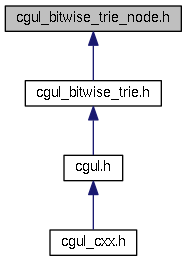bitwise trie node More...


Typedefs | |
| typedef typedefCGUL_BEGIN_C struct cgul_bitwise_trie_node * | cgul_bitwise_trie_node_t |
Functions | |
| CGUL_EXPORT unsigned long int | cgul_bitwise_trie_node__get_index (cgul_exception_t *cex, cgul_bitwise_trie_node_t n) |
| CGUL_EXPORT void * | cgul_bitwise_trie_node__get_value (cgul_exception_t *cex, cgul_bitwise_trie_node_t n) |
| CGUL_EXPORT void | cgul_bitwise_trie_node__set_value (cgul_exception_t *cex, cgul_bitwise_trie_node_t n, const void *value) |
| CGUL_EXPORT cgul_bitwise_trie_node_t | cgul_bitwise_trie_node__get_older (cgul_exception_t *cex, cgul_bitwise_trie_node_t n) |
| CGUL_EXPORT cgul_bitwise_trie_node_t | cgul_bitwise_trie_node__get_younger (cgul_exception_t *cex, cgul_bitwise_trie_node_t n) |
Detailed Description
This class implements a bitwise trie node which holds one index/value pair.
Typedef Documentation
§ cgul_bitwise_trie_node_t
| typedef typedefCGUL_BEGIN_C struct cgul_bitwise_trie_node* cgul_bitwise_trie_node_t |
Opaque pointer to a cgul_bitwise_trie_node instance.
Function Documentation
§ cgul_bitwise_trie_node__get_index()
| CGUL_EXPORT unsigned long int cgul_bitwise_trie_node__get_index | ( | cgul_exception_t * | cex, |
| cgul_bitwise_trie_node_t | n | ||
| ) |
Return the index stored in this node. If you want to set the value of the index, there is no method to do so because changing the value of a index requires changing the node's position in the cgul_bitwise_trie. Thus, if you need to change the value of a index, you should delete the node from the cgul_bitwise_trie and insert a new node with the new value for the index.
- Parameters
-
[in] cex c-style exception [in] n cgul_bitwise_trie_nodeinstance
- Returns
- index
§ cgul_bitwise_trie_node__get_value()
| CGUL_EXPORT void* cgul_bitwise_trie_node__get_value | ( | cgul_exception_t * | cex, |
| cgul_bitwise_trie_node_t | n | ||
| ) |
Return the value stored in this node.
- Parameters
-
[in] cex c-style exception [in] n cgul_bitwise_trie_nodeinstance
- Returns
- value
§ cgul_bitwise_trie_node__set_value()
| CGUL_EXPORT void cgul_bitwise_trie_node__set_value | ( | cgul_exception_t * | cex, |
| cgul_bitwise_trie_node_t | n, | ||
| const void * | value | ||
| ) |
Set the value stored in this node.
- Parameters
-
[in] cex c-style exception [in] n cgul_bitwise_trie_nodeinstance[in] value
§ cgul_bitwise_trie_node__get_older()
| CGUL_EXPORT cgul_bitwise_trie_node_t cgul_bitwise_trie_node__get_older | ( | cgul_exception_t * | cex, |
| cgul_bitwise_trie_node_t | n | ||
| ) |
Return the next older node. Together with cgul_bitwise_trie_node__get_younger(), this method lets you traverse the tree in chronological order. If there is no older node, this method returns NULL.
The following example shows how to iterate over the entire tree in reverse chronological order. Notice that you have to start with the youngest node when calling cgul_bitwise_trie_node__get_older():
cgul_bitwise_trie_node_t n = cgul_bitwise_trie__get_youngest(cex, t);
for ( ; n ; n = cgul_bitwise_trie_node__get_older(cex, n)) {
...
}
- Parameters
-
[in] cex c-style exception [in] n cgul_bitwise_trie_nodeinstance
- Returns
- older node
§ cgul_bitwise_trie_node__get_younger()
| CGUL_EXPORT cgul_bitwise_trie_node_t cgul_bitwise_trie_node__get_younger | ( | cgul_exception_t * | cex, |
| cgul_bitwise_trie_node_t | n | ||
| ) |
Return the next younger node. Together with cgul_bitwise_trie_node__get_older(), this method lets you traverse the tree in chronological order. If there is no younger node, this method returns NULL.
The following example shows how to iterate over the entire tree in chronological order. Notice that you have to start with the oldest node when calling cgul_bitwise_trie_node__get_younger():
cgul_bitwise_trie_node_t n = cgul_bitwise_trie__get_oldest(cex, t);
for ( ; n ; n = cgul_bitwise_trie_node__get_younger(cex, n)) {
...
}
- Parameters
-
[in] cex c-style exception [in] n cgul_bitwise_trie_nodeinstance
- Returns
- younger node
